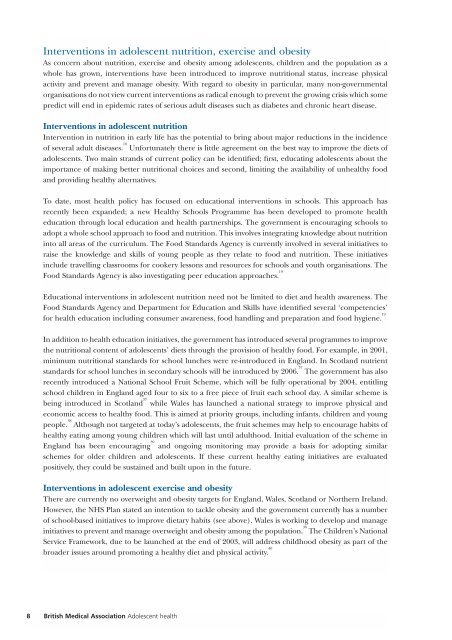Alcohol misuse: tackling the UK epidemic - London
Alcohol misuse: tackling the UK epidemic - London
Alcohol misuse: tackling the UK epidemic - London
Create successful ePaper yourself
Turn your PDF publications into a flip-book with our unique Google optimized e-Paper software.
8<br />
Interventions in adolescent nutrition, exercise and obesity<br />
As concern about nutrition, exercise and obesity among adolescents, children and <strong>the</strong> population as a<br />
whole has grown, interventions have been introduced to improve nutritional status, increase physical<br />
activity and prevent and manage obesity. With regard to obesity in particular, many non-governmental<br />
organisations do not view current interventions as radical enough to prevent <strong>the</strong> growing crisis which some<br />
predict will end in <strong>epidemic</strong> rates of serious adult diseases such as diabetes and chronic heart disease.<br />
Interventions in adolescent nutrition<br />
Intervention in nutrition in early life has <strong>the</strong> potential to bring about major reductions in <strong>the</strong> incidence<br />
of several adult diseases. 10<br />
Unfortunately <strong>the</strong>re is little agreement on <strong>the</strong> best way to improve <strong>the</strong> diets of<br />
adolescents. Two main strands of current policy can be identified; first, educating adolescents about <strong>the</strong><br />
importance of making better nutritional choices and second, limiting <strong>the</strong> availability of unhealthy food<br />
and providing healthy alternatives.<br />
To date, most health policy has focused on educational interventions in schools. This approach has<br />
recently been expanded; a new Healthy Schools Programme has been developed to promote health<br />
education through local education and health partnerships. The government is encouraging schools to<br />
adopt a whole school approach to food and nutrition. This involves integrating knowledge about nutrition<br />
into all areas of <strong>the</strong> curriculum. The Food Standards Agency is currently involved in several initiatives to<br />
raise <strong>the</strong> knowledge and skills of young people as <strong>the</strong>y relate to food and nutrition. These initiatives<br />
include travelling classrooms for cookery lessons and resources for schools and youth organisations. The<br />
Food Standards Agency is also investigating peer education approaches. 19<br />
Educational interventions in adolescent nutrition need not be limited to diet and health awareness. The<br />
Food Standards Agency and Department for Education and Skills have identified several ‘competencies’<br />
for health education including consumer awareness, food handling and preparation and food hygiene. 19<br />
In addition to health education initiatives, <strong>the</strong> government has introduced several programmes to improve<br />
<strong>the</strong> nutritional content of adolescents’ diets through <strong>the</strong> provision of healthy food. For example, in 2001,<br />
minimum nutritional standards for school lunches were re-introduced in England. In Scotland nutrient<br />
standards for school lunches in secondary schools will be introduced by 2006. 37<br />
The government has also<br />
recently introduced a National School Fruit Scheme, which will be fully operational by 2004, entitling<br />
school children in England aged four to six to a free piece of fruit each school day. A similar scheme is<br />
being introduced in Scotland 37<br />
while Wales has launched a national strategy to improve physical and<br />
economic access to healthy food. This is aimed at priority groups, including infants, children and young<br />
people. 38<br />
Although not targeted at today’s adolescents, <strong>the</strong> fruit schemes may help to encourage habits of<br />
healthy eating among young children which will last until adulthood. Initial evaluation of <strong>the</strong> scheme in<br />
England has been encouraging 39<br />
and ongoing monitoring may provide a basis for adopting similar<br />
schemes for older children and adolescents. If <strong>the</strong>se current healthy eating initiatives are evaluated<br />
positively, <strong>the</strong>y could be sustained and built upon in <strong>the</strong> future.<br />
Interventions in adolescent exercise and obesity<br />
There are currently no overweight and obesity targets for England, Wales, Scotland or Nor<strong>the</strong>rn Ireland.<br />
However, <strong>the</strong> NHS Plan stated an intention to tackle obesity and <strong>the</strong> government currently has a number<br />
of school-based initiatives to improve dietary habits (see above). Wales is working to develop and manage<br />
initiatives to prevent and manage overweight and obesity among <strong>the</strong> population. 38<br />
The Children’s National<br />
Service Framework, due to be launched at <strong>the</strong> end of 2003, will address childhood obesity as part of <strong>the</strong><br />
broader issues around promoting a healthy diet and physical activity. 40<br />
British Medical Association Adolescent health
















